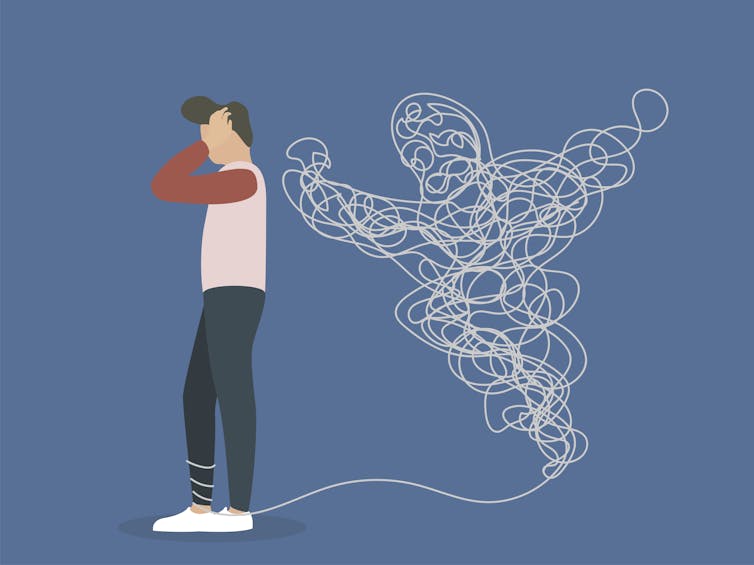The stories we hear and tell help us make meaning of our lives in the world. We communicate our thoughts and feelings, share knowledge and begin dialogue about things that matter.
Moral distress occurs when our core values are threatened or compromised, when we know what ethical action is called for and feel powerless to take it. As a nurse and an ethicist and spiritual care provider, we have witnessed the symptoms of moral distress in our clinical, administrative and academic work.
In health care, moral distress can be caused by external pressures such as policy guidelines or limited resources or internal factors such as self-doubt or fear of conflict. When we compromise our core values, we may feel shame, guilt or isolation. And when moral distress is unresolved, health-care workers can experience depression and other mental and spiritual health struggles.
The experience of moral distress among health-care providers has received much attention during the pandemic. In particular, the nursing profession anticipates high rates of post-pandemic exodus, almost certainly driven to a substantial degree by accumulated and unresolved moral distress.
Our work examines stories that look at what it means to live well through the COVID-19 pandemic, a grander story that is unprecedented in our lifetimes.
Get The Latest By Email
Moral distress stories
Early in the pandemic, the promise of returning to normal was tied to the development of a vaccine. At that time, there was little conversation about the challenges of vaccinating enough people to ensure herd immunity. Nor was there conversation about access, equity and staging of vaccination rollout.
Drawing from our own experience and research, we found that questions about the socio-political context of vaccination programs are rampant and complex. The following examples — developed from our experience and research findings — demonstrate how these challenges manifest in daily life.
Lin and her partner received early vaccination due to her partner’s chronic medical condition. As his primary care giver, Lin “jumped the queue” and got an early vaccine. She knows someone with diabetes who has not had their first dose and who lives in the hot spot of Peel Region, just east of Toronto. Was it right that Lin got hers before them?
Lin highly values her family. However, by using her privileged knowledge of the health care system to “jump the vaccine queue,” Lin fears that she compromised her value of caring for all people, especially those who are marginalized. As a result, she feels shame.
Sam followed the directive that the “first vaccine is the best vaccine.” They got the AstraZeneca vaccine. And now, months later, as they watched several provinces withdraw the vaccine for use as a first dose, Sam wonders: “What will happen next? Did I do the right thing or did I not take adequate responsibility for my health? Will my second dose be a different kind of vaccine? What are the risks? And what will happen to all that unused vaccine?”
Sam values informed consent and individual responsibility, and has feelings of regret over blindly accepting the first vaccine. Their confidence in science is dwindling. Sam feels powerlessness.
Both Sam and Lin question their core value of global social justice as they watch Canada backing away from the AstraZeneca vaccine in favour of other options.

To live well through this pandemic, we need to understand three things about experiences of moral distress:
1. Moral distress can affect everyone
Events and circumstances during this pandemic have routinely stretched and challenged core values. Not only are people experiencing the mental distress of living in a pandemic, but these feelings are often being compounded by the violation of people’s core values.
When people feel shame, they feel too embarrassed to tell anyone what they fear they have done. So they become increasingly isolated — on top of pandemic isolation. They feel they have damaged the core of their being.
To live well through this pandemic, we need to recognize that feelings of moral uncertainty and distress are normal and real.
2. Moral distress can produce both negative and positive outcomes
Unresolved moral distress can be debilitating. Paradoxically, it can help us to develop moral resiliency — the ability to maintain one’s moral integrity in trying situations, which requires experiences of moral adversity. When we practise standing up for what we believe, we can become better able to stand strong in the future. We can also become clearer about what our core values are such as family, caring, social justice, health or relationships.
The relationships that we find in community can help us to explore how to process moral uncertainty.
To live well through this pandemic we need to have our moral stories witnessed and normalized.
3. Moral distress can prompt self-reflection
Good things can come from moral adversity. Education about ethics is crucial including learning about core values and finding words to express core values. Studies show that understanding the language around ethics may be a significant factor in helping people resolve moral distress.
Take time to explore your core values. To live well through the pandemic is to know that our choices aren’t ideal and our knowledge is not complete.
We must look beyond ourselves to understand the values of others and the reality we face together.







